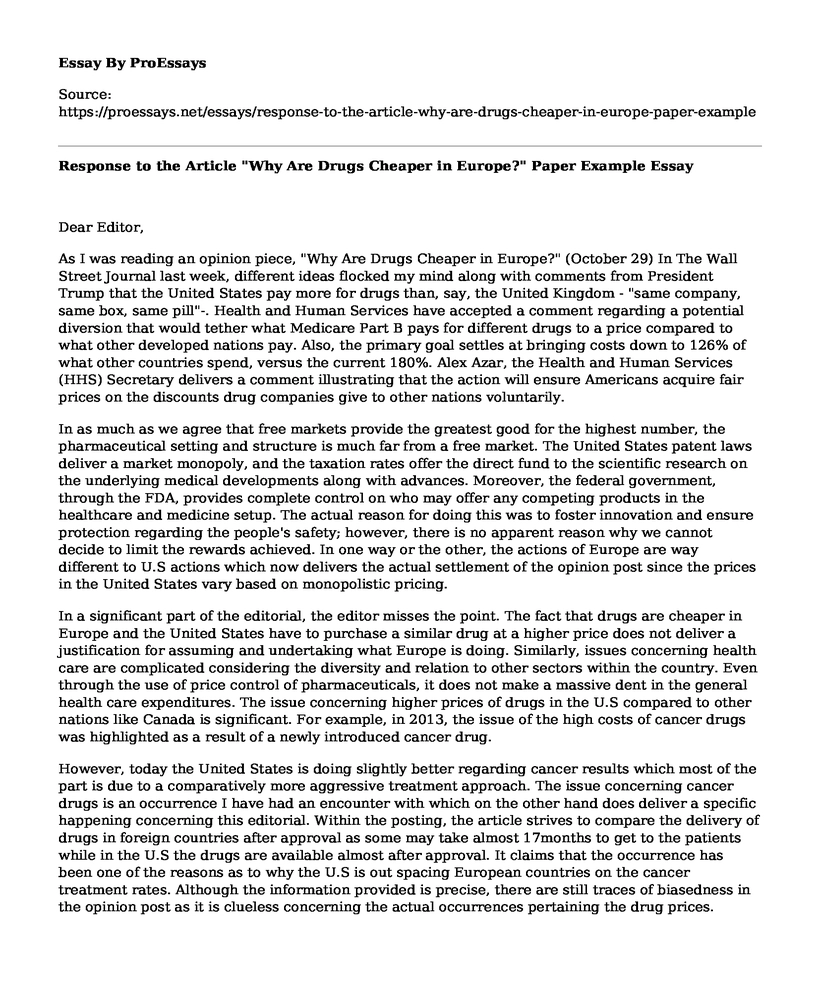Dear Editor,
As I was reading an opinion piece, "Why Are Drugs Cheaper in Europe?" (October 29) In The Wall Street Journal last week, different ideas flocked my mind along with comments from President Trump that the United States pay more for drugs than, say, the United Kingdom - "same company, same box, same pill"-. Health and Human Services have accepted a comment regarding a potential diversion that would tether what Medicare Part B pays for different drugs to a price compared to what other developed nations pay. Also, the primary goal settles at bringing costs down to 126% of what other countries spend, versus the current 180%. Alex Azar, the Health and Human Services (HHS) Secretary delivers a comment illustrating that the action will ensure Americans acquire fair prices on the discounts drug companies give to other nations voluntarily.
In as much as we agree that free markets provide the greatest good for the highest number, the pharmaceutical setting and structure is much far from a free market. The United States patent laws deliver a market monopoly, and the taxation rates offer the direct fund to the scientific research on the underlying medical developments along with advances. Moreover, the federal government, through the FDA, provides complete control on who may offer any competing products in the healthcare and medicine setup. The actual reason for doing this was to foster innovation and ensure protection regarding the people's safety; however, there is no apparent reason why we cannot decide to limit the rewards achieved. In one way or the other, the actions of Europe are way different to U.S actions which now delivers the actual settlement of the opinion post since the prices in the United States vary based on monopolistic pricing.
In a significant part of the editorial, the editor misses the point. The fact that drugs are cheaper in Europe and the United States have to purchase a similar drug at a higher price does not deliver a justification for assuming and undertaking what Europe is doing. Similarly, issues concerning health care are complicated considering the diversity and relation to other sectors within the country. Even through the use of price control of pharmaceuticals, it does not make a massive dent in the general health care expenditures. The issue concerning higher prices of drugs in the U.S compared to other nations like Canada is significant. For example, in 2013, the issue of the high costs of cancer drugs was highlighted as a result of a newly introduced cancer drug.
However, today the United States is doing slightly better regarding cancer results which most of the part is due to a comparatively more aggressive treatment approach. The issue concerning cancer drugs is an occurrence I have had an encounter with which on the other hand does deliver a specific happening concerning this editorial. Within the posting, the article strives to compare the delivery of drugs in foreign countries after approval as some may take almost 17months to get to the patients while in the U.S the drugs are available almost after approval. It claims that the occurrence has been one of the reasons as to why the U.S is out spacing European countries on the cancer treatment rates. Although the information provided is precise, there are still traces of biasedness in the opinion post as it is clueless concerning the actual occurrences pertaining the drug prices.
Additionally, the article creates a different perception as in most cases they miss the point. For example, with a statement such as, "every time a nation demands a lower price, it results in a lower reference price used by other nations. Such drug controls hinder drug companies from charging market rates for their commodities while at the same time delaying the availability of new cures for patients in the countries implementing the policies." Nonetheless, if you consider a similar article or topic in the New York Times, there is more to the occurrence than just shifting practices or acting similarly as European nations as suggested. As numerous countries such as Europe are freeloaders on the U.S, there is a precise argument and illustration on the topic. For instance, the Americans are subsidizing the prices of drugs worldwide. Correspondingly, the European government represses the pricing of the drugs in the markets to ensure that their populations and citizens gain from investments and scientific development made in the United States. The occurrence answers the question concerning the failure and destruction of pharmaceutical innovation and investment in Europe but remains anonymous and robust in the United States.
Conclusion
To sum everything up, different interventions may be considered concerning the issue of higher drug prices in the U.S than in Europe. The European markets could pay market prices for the United States pharmaceutical products which would help bring down the prices in the U.S. as the article "Why Are Drugs Cheaper in Europe?" (October 29) Provides delivered information and illustration from the different parties involved in the issues, it ensures a proper elaboration of the details. However, a broader consideration is essential especially in providing minimal biasedness and increase understanding regarding the matter of high drug price in the U.S.
Works Cited
The Editorial Board. "Opinion | Why Are Drugs Cheaper in Europe?". WSJ, 2018, https://www.wsj.com/articles/why-are-drugs-cheaper-in-europe-1540760855
Cite this page
Response to the Article "Why Are Drugs Cheaper in Europe?" Paper Example. (2022, Sep 22). Retrieved from https://proessays.net/essays/response-to-the-article-why-are-drugs-cheaper-in-europe-paper-example
If you are the original author of this essay and no longer wish to have it published on the ProEssays website, please click below to request its removal:
- Addison's Disease Overview Paper Example
- Research Paper on The Guide to Community Preventive Services
- Paper Example on Asthma: Evolving Pharmacotherapy and Pathophysiology
- Essay Example on Health Promo Plans: Empower & Engage for Better Health
- Research Paper on Nursing Profession: Challenges & Quality Care Amidst Healthcare Facilities
- Japanese Yen Crisis - Research Paper Sample
- Nurturing Effective Communication and Holistic Care: Strategies for Dementia and Hearing-Impaired Patients







